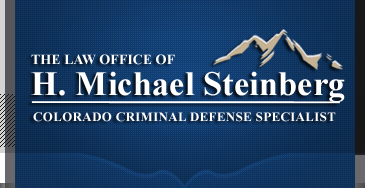






When A Criminal Trial Witness Flees The State – Can They Be Forced To Return? – The Material Witness Warrant
By H. Michael Steinberg Colorado Criminal Defense Lawyer
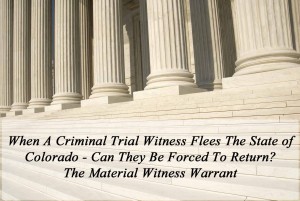 When A Criminal Trial Witness Flees The State – Can They Be Forced To Return? – The Material Witness Warrant – It is commonly believed that if a key witness, or “material” witness, flees a state to avoid testifying in a criminal trial and appears beyond the reach of the local criminal court jurisdiction, that witness is “safe” from the Court’s subpoena.
When A Criminal Trial Witness Flees The State – Can They Be Forced To Return? – The Material Witness Warrant – It is commonly believed that if a key witness, or “material” witness, flees a state to avoid testifying in a criminal trial and appears beyond the reach of the local criminal court jurisdiction, that witness is “safe” from the Court’s subpoena.
This article describes the reach of Colorado’s jurisdiction to compel the attendance of said material witness using the “Uniform Act to Secure the Attendance of Witnesses from Without a State in Criminal Proceedings” (the Act).
Essentially, each state is considered a “sovereign” entity within it’s own borders.
“[N]o state court or government has authority beyond its own borders, each state being sovereign as to its own territory and those residing therein.” In Colorado A subpoena may be served on a witness outside of Colorado “only as provided by law.” Crim. P. 17(f)(2).
All of the States understood this concept way back in the early twentieth century so they provided for a tool to address this issue. That tool is known as a “Uniform Law” and was created in 1936 to prevent citizen witnesses from obstructing justice by fleeing to avoid a State’s legal right to compel them to testify in a criminal trial.
This uniform law is called “The Uniform Act to Secure Attendance of Witnesses From Without State” (the Act) and it exists for the sole purpose of securing and assuring the presence of the witness at the trial in another state other than the witnesses’ home state.
The Act, which has several red tape “hoops,” is far from a perfect solution to this problem. While it permits each state, such as Colorado (which adopted the law in 1939), to secure the attendance of witnesses who do not reside in Colorado but in “State B,” there are procedures in the Act that can be used by Colorado criminal defense lawyers to defeat the reach of the Act – and the purpose of the Act – the forced extradition of an alleged material witness to a criminal case (see below).
Like almost all uniform laws, the Act has been adopted in ALL 50 states, the District of Columbia, Puerto Rico, and the Virgin Islands. It is worth noting here, however, that the reach of the Act extends only within the United States.
In Colorado, the law is found (codified) in the Colorado Revised Statutes C.R.S. at Section 16-9-203 and Section 16-9-202 :
§ 16-9-203. Witness from Another State
(1) If a person in any state which by its laws has made provision for commanding persons within its borders to attend and testify in criminal prosecutions or grand jury investigations commenced or about to commence in this state is a material witness in a prosecution pending in a court of record in this state or in a grand jury investigation which has commenced or is about to commence, a judge of such court may issue a certificate under the seal of the court stating these facts and specifying the number of days the witness will be required. The certificate may include a recommendation that the witness be taken into immediate custody and delivered to an officer of this state to assure his attendance in this state. This certificate shall be presented to a judge of a court of record in the county in which the witness is found
(2) If the witness is summoned to attend and testify in this state, or if the witness appears voluntarily at the request of the prosecution or the defense and the court would have otherwise approved a certificate for such witness pursuant to subsection (1) of this section, he shall be tendered the sum of ten cents a mile for each mile by the ordinary traveled route to and from the court where the prosecution is pending or, in the alternative and at the discretion of the court, an airplane ticket and twenty dollars for each day that he is required to travel and attend as a witness. A witness who has appeared in accordance with the provisions of the summons shall not be required to remain within this state a longer period of time than the period mentioned in the certificate, unless otherwise ordered by the court. If a witness, after coming into this state, fails without good cause to attend and testify as directed in the summons, he shall be punished in the manner provided for the punishment of any witness who disobeys a summons issued from a court of record in this state
Essential Summary Of The Act
Under Colorado law, Sections 16-9-202 and 16-9-203 are the laws that provide authority for a Colorado court to certify, “under its seal” (proof of the state’s sovereignty), that the person sought as a witness is “material” to a prosecution pending within the state of Colorado’s jurisdiction.
When this “Certificate” is presented to a court in the state (State B) where the witness is found, the local Judge presiding in State B, if the provisions of the Act are followed properly, must fix a time and place for a hearing and then order the attendance of the alleged “material” witness. The purpose of the hearing is to determine whether to order the witness to appear in the criminal trial that is to be held in Colorado.
This introduces Section 16-9-202:
Section 16-9-202(2) provides:
If at a hearing the judge determines that the witness is material and necessary, that it will not cause undue hardship to the witness to be compelled to attend and testify in the prosecution or a grand jury investigation in the other state, and that the laws of the state in which the prosecution is pending or grand jury investigation has commenced or is about to commence, and of any other state through which the witness may be required to pass by ordinary course of travel, will give to him protection from arrest and the service of civil and criminal process in connection with matters which arose
Before his entering into that state under the summons, he shall issue a summons, with a copy of the certificate attached, directing the witness to attend and testify in the court where the prosecution is pending or where a grand jury investigation has commenced or is about to commence at a time and place specified in the summons. In any such hearing, the certificate shall be prima facie evidence of all the facts stated therein.
The Act Requires A 6 Part Procedure To Work
1. A lawyer, usually a prosecutor in Colorado, obtains a Certificate from a Judge in Colorado. That certificate establishes that “there is a criminal prosecution pending in such court, or that a grand jury investigation has commenced or is about to commence, that a person being within State B is a material witness in such prosecution, or grand jury investigation, and that his presence will be required for a specified number of days.”
2. The Colorado prosecutor then sends the Certificate to a prosecutor or county lawyer in State B.
3. The prosecutor in State B locates a Judge where the alleged material witness is found in State B and requests that Judge to issue an Order of Appearance at hearing.
4. The State B prosecutor obtains the Judge’s signature and then serves the alleged material witness with an “Order of Appearance.”
5. At the Show Cause – Material Witness Hearing, the State B Judge determines whether:
a. the witness is material and necessary,
b. whether it will cause undue hardship to the witness to be compelled to attend and testify in Colorado, and
c. whether the laws of Colorado give the witness protection from arrest and the service of process.
If the witness is material and the other tests are met, State B Judge issues a Summons directing the witness to attend and testify in the court in Colorado.
6. Colorado then pays for the witness’s travel and lodging expenses.
Some Points At Which This Process Can Be Stopped
1. Establishing the Location Of The Material Witness:
The prosecutor must actually know where the material witness resides. State B must have adequate information to enable State B to locate the witness. This information is critical to determining exactly which county court Judge to use to enforce the Act’s mechanisms.
2. The Form Of The Motion And Certificate:
IF the witness is located, and Colorado files what is usually referred to as a “Motion to Secure the Attendance of Out-of-State Witness” or an “Application for a Certificate of Materiality,” that application must meet the requirements of the law.
The Colorado Judge’s Certificate must be properly prepared as it is the most important document in the entire process.
The Certificate must be made “under the seal of the Court” from a court of record in the State of Colorado and it must contain the following:
(A). A statement that a criminal prosecution is pending in the court or that a grand jury investigation has commenced or is about to commence;
(B). A statement that the requested witness is, in fact, a material witness for the State of Colorado in a criminal proceeding;
(C). The exact number of days that the witness will be required to be present in Colorado; and
(D). The seal of the court.
3. The Absence Of A Prima Facie Showing In The Certificate
Often the Certificate is lacking anything more than a “conclusory” statement of the witness’s materiality. It must alleged specific facts, I would argue in the form of an affidavit attached to the Motion, which affidavit details the specific grounds that support the Motion and meet the specific requirements of the Act.
While the Certificate must provide only a “bare bones” or prima facie showing necessary to enforce the provisions of the Uniform Law, it should be scrutinized for errors or unsupportable assertions. If the Certificate IS prepared properly, it may only be a prima facie showing that permits the materiality hearing to move forward and areas of attack remain available to the criminal defense lawyer at the Materiality or Show Cause Hearing.
4. Attacking The Component Requirements Of The Act
The Act expressly permits a lawyer (usually a lawyer trained in criminal law) to attack and to defeat the reach of the Act by establishing to the satisfaction of the Court that:
1) the witness is NOT MATERIAL or NOT NECESSARY;
2) the subpoena will CAUSE UNDUE HARDSHIP to the witness if that witness is compelled to attend and testify; and
3) the witness is NOT EXEMPT from arrest and service of process once in the state seeking the material witness subpoena.
4) there is no provision in the Certificate that acknowledges the need TO COMPENSATE THE WITNESS and a promise to provide “witness fees” as well as transportation and lodging expenses.
A Review – The Expected Normal “Mechanics” Of The Process – Non Arrest
After State B receives Colorado’s Motion and the Certificate under Seal, the prosecutor in State B presents it to a Judge in State B where the witness is located. The “packet” usually contains a proposed Order To Show Cause addressed to the witness as well as a copy of the Motion and the Certificate. The packet is then properly served on the witness.
A Show Cause Order means that the witness, if properly served, must attend the Show Cause or “Materiality” Hearing in his or her home county. If they refuse, they are arrested and ordered to Show Cause why they have failed to comply with the Court Order. Most states provide the witness a form – called a waiver form, that allows the witness to consent to the Court’s jurisdiction and promise to appear as ordered.
At the SHOW-CAUSE or “MATERIALITY” HEARING, the alleged material witness has the right to counsel and has the right to fight the process and to object to being compelled to testify in a foreign state.
If the Judge makes the required findings after a full and fair hearing, the Judge issues a summons directing the witness to attend and testify in the Colorado trial, grand jury, or other proceeding as requested. If the witness refuses, they are subject to the penalties of their home state for disobeying a subpoena to testify.
So Called “Specialized” Requests – The Arrest And Transport Of The Material Witness – The Material Witness Warrant
The Uniform Act to Secure the Attendance of Witnesses from Without a State in Criminal Proceedings provides for the arrest of an alleged uncooperative or so called “hostile” material witness.
There exists a “mechanism” for an alleged material witness to be brought immediately before a judge in his or her home state jurisdiction, and at the conclusion of the show cause – materiality hearing, to be taken into custody and delivered to Colorado.
For this to occur, the Certificate must state grounds, again more than mere conclusory statements, that the witness is hostile and may flee the jurisdiction to avoid the material witness procedure outlined above, or will otherwise refuse to cooperate with the otherwise voluntary out of state witness subpoena procedure provided for in the Act.
The form the Certificate usually takes is for Colorado to request State B’s Judge to direct that the material witness be immediately taken into custody upon receipt of the “packet” and that the material witness be brought “forthwith” brought before the Court for the hearing, as opposed to the setting of a show-cause hearing at a future date. The theory here is that by giving the alleged material witness advance notice of the hearing, and then not arresting that witness may flee the Court’s jurisdiction.
This extreme procedure requires the criminal defense lawyer to act swiftly and competently to stop this “taking” of an innocent person’s freedom and liberty. A lawyer retained in this situation must “drop everything” he or she is doing at that time and put together a case that persuades the local judge to release the witness from custody. That case should not only “assault” the alleged grounds for arrest and involuntary transport of the alleged material witness in custody like a convicted felon, but should attack every detail of the State’s case for ordering the witness to testify in the Colorado case.
A recent example of this process can be found by following this link to the procedure used in the so called Colorado Holmes or Aurora Theatre Shooting Case.
When A Criminal Trial Witness Flees The State – Can They Be Forced To Return? – The Material Witness Warrant
If you found any of the information I have provided on this web page article helpful please click my Plus+1 or the Share buttons below so that others may also find it.
Never stop fighting – never stop believing in yourself and your right to due process of law.
ABOUT THE AUTHOR: H. Michael Steinberg – Email The Author at [email protected] – A Denver Colorado Criminal Defense Lawyer – or call his office at 303-627-7777 during business hours – or call his cell if you cannot wait and need his immediate assistance – 720-220-2277. Attorney H. Michael Steinberg is passionate about criminal defense. His extensive knowledge and experience of Colorado Criminal Law gives him the edge you need to properly handle your case.
You should be careful to make a responsible choice in selecting a Colorado Criminal Defense Lawyer – and we encourage you to “vet” our firm. Over the last 40 plus years – by focusing ONLY on Colorado criminal law – H. Michael has had the necessary time to commit to the task of constantly updating himself on nearly every area of criminal law, to include Colorado criminal law and procedure and trial and courtroom practice. H. Michael works hard to get his clients the best possible results in and out of the courtroom. He has written, and continues to write, extensively on Colorado criminal law and he hopes this article helps you in some small way…
When A Criminal Trial Witness Flees The State – Can They Be Forced To Return? – The Material Witness Warrant.
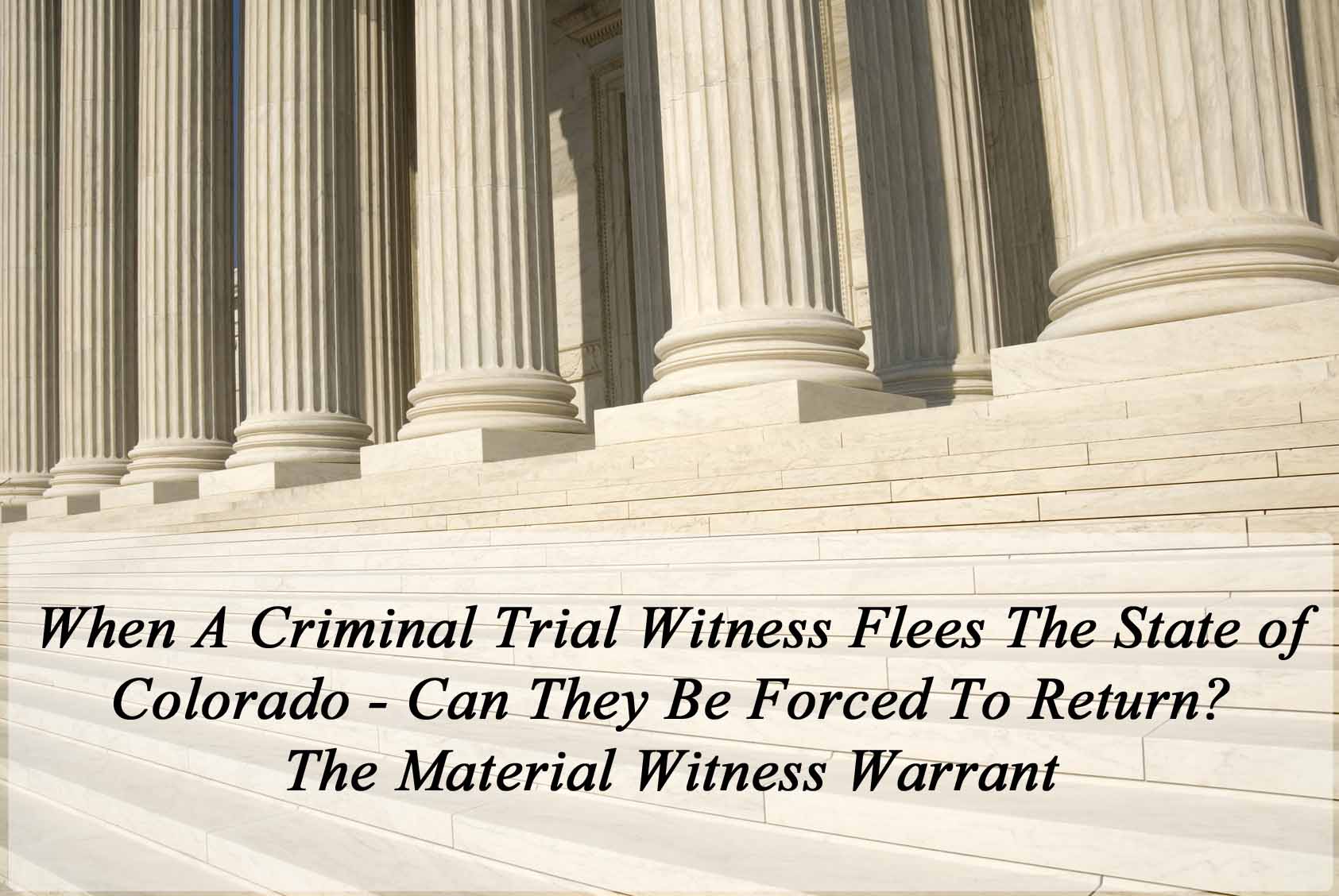
Other Articles of Interest:
- Making “Discovery”
- Investigation by the Defense
- Colorado Criminal Law – One Witness Cannot Testify That Another Witness Is Telling The Truth – Bolstering
- Colorado Criminal Law – The Rules of Discovery in Colorado – Getting The Information You Need To Defend Your Clients
- Forensic Searches Of Computers In Colorado How Long Can The Search Take?
